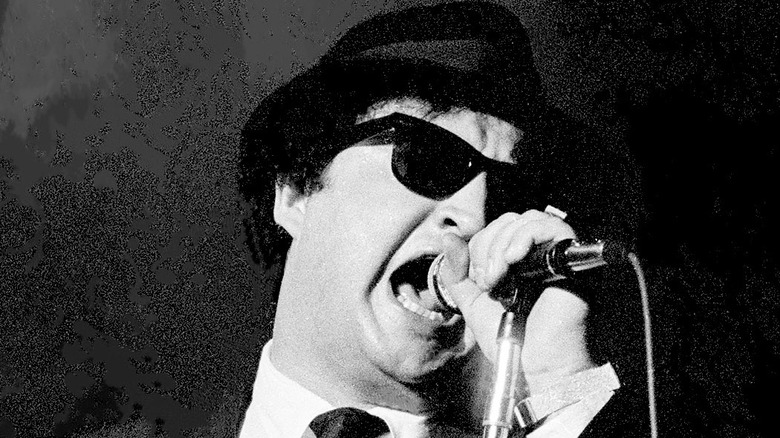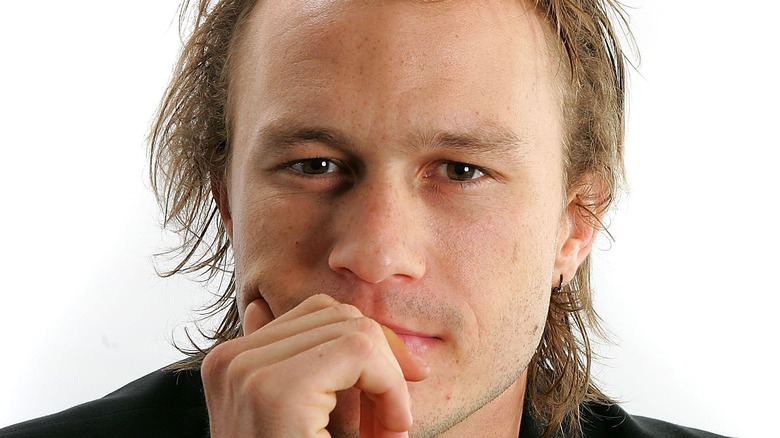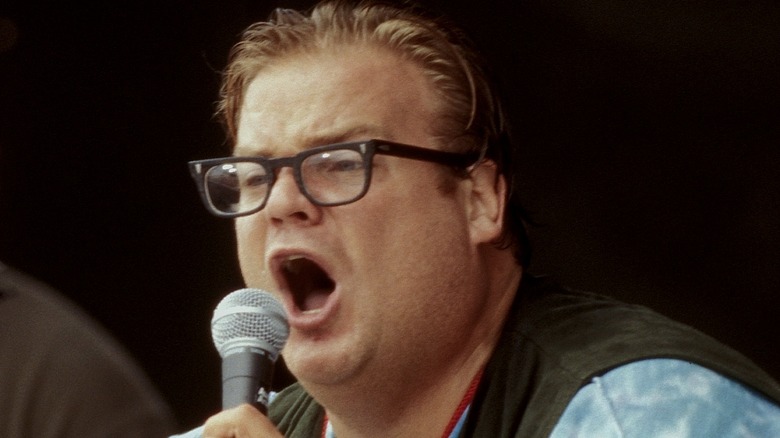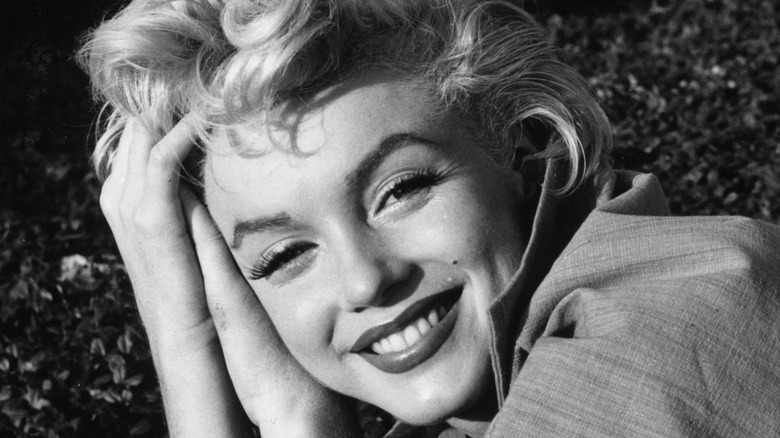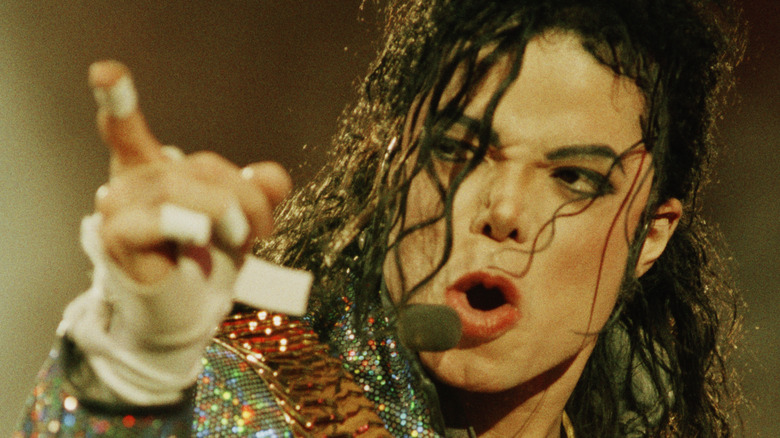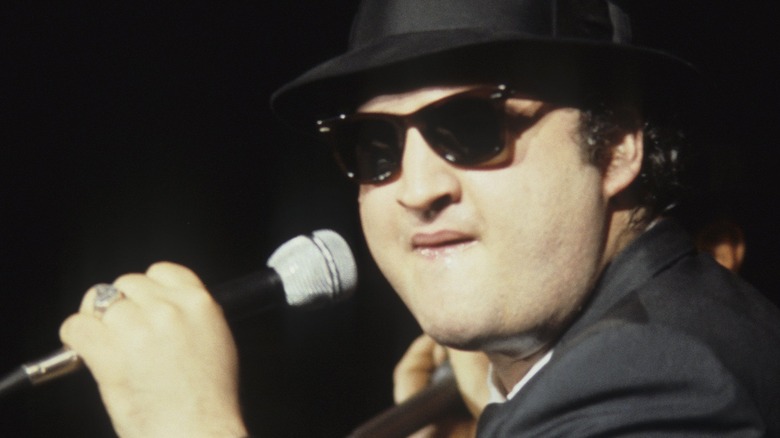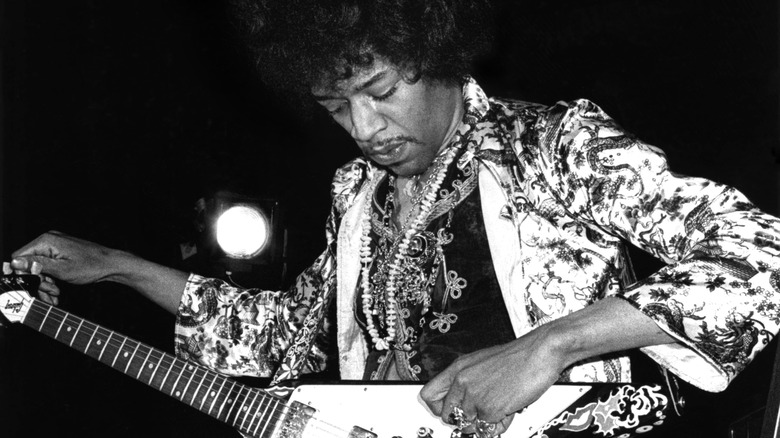Items Found By Police Where Celebrities Died
Correction 12/22/22: A previous version of this article stated that Heath Ledger won an Oscar in 2008, the same year he died. But he won posthumously in 2009, not 2008.
Death: it comes for everyone, rich or poor, obscure or famous. The death of a public figure can invite intense grief, reflection, or controversy, and 2022 has seen a significant number of high-profile figures die. As the Society for Personality and Social Psychology explains, the ubiquitous presence of certain people in our lives through media invites a one-way bond, and the death of such a person can be as intense as the loss of a friend or family member. ABC News compiled a list of 87 big names to die in 2022, including Queen Elizabeth II, Angela Lansbury, Paul Sorvino, and Ray Liotta.
But sincere mourning for notable figures in art and entertainment can mingle with a morbid curiosity about how and why they died. Such curiosity is perhaps heightened when a celebrity dies in tragic or mysterious circumstances, or as a result of personal demons. Fame and fortune open doors to many temptations, and some succumb to them. In investigating such tragedies, police have often found evidence of vices. At other times, such evidence was removed before the police or the press could get wind of it. Here are a few such items found after the deaths of celebrities.
Heath Ledger
Heath Ledger's death on January 22, 2008, at age 28, was a shock to the acting community and his native Australia. Fellow actor-citizens of the land down under Nicole Kidman and Mel Gibson issued statements paying tribute to their compatriot (via ABC News). At the time of his death, Ledger's most renowned work was in "Brokeback Mountain," which brought him several award nominations, and he was seen as a rising star. His interpretation of the Joker in "The Dark Knight," already anticipated before his death, won him an Oscar posthumously the next year (via Oscars).
While playing the Joker, Ledger complained of a restless mind and an inability to sleep, an issue that a turn to Ambien couldn't settle. Initial statements by police indicated drugs as a contributing factor in his death. After Ledger's body was found by a masseuse and housekeeper, authorities found bottles of alprazolam and diazepam. Both are medications prescribed to treat anxiety.
Shortly after his death, per CNN, the New York medical examiner's office concluded in Ledger's autopsy report that he died of an accidental overdose. Besides alprazolam and diazepam, he was found to have two sleep medications and two painkillers in his system. In a statement, Ledger's family said that none of the drugs had been abused. Rather, it seemed like it was an accidentally lethal combination in his system.
If you or anyone you know needs help with addiction issues, help is available. Visit the Substance Abuse and Mental Health Services Administration website or contact SAMHSA's National Helpline at 1-800-662-HELP (4357).
Chris Farley
Chris Farley loved to have a good time, and the actor and comedian shot to fame through his years of manic, boisterous performances on "Saturday Night Live." A promising movie career, begun with cameos, launched in earnest when Farley starred in "Tommy Boy." Comparisons were made to his comic idol, John Belushi. But besides a wild sense of humor, the two men shared an addiction to drugs and would die of the same combination of them, per the Chicago Tribune.
Farley's battle with substance abuse was almost lifelong. As noted by Entertainment Weekly, he had done 17 stints in rehab centers in an effort to get sober by 1997. Besides drugs, Farley abused alcohol and food. Friend Charna Halpern described him to the Tribune as someone who went all-in on everything, including his vices. When Farley died on December 18, 1997, a poor heart and a combination of cocaine and heroin were blamed. Ironically, Farley indicated to Rolling Stone he was looking forward to breaking the chain of comparisons in the months before his death.
In "The Chris Farley Show: A Biography in Three Acts," friend and assistant Ted Dondanville recalled that press coverage of the death mentioned no drugs found in Farley's home except for prescribed antidepressants. But Dondanville said that Chicago police, in an unspoken decision to dispose of evidence, passed cocaine and other substances to him for removal.
If you or anyone you know needs help with addiction issues, help is available. Visit the Substance Abuse and Mental Health Services Administration website or contact SAMHSA's National Helpline at 1-800-662-HELP (4357).
Marilyn Monroe
In its obituary for Marilyn Monroe in 1962, The New York Times rather cruelly said, "Her fame was greater than her contributions as an actress," drawing on reports from friends and coworkers to paint Monroe as a shut-in, closed off from the world in a small house and nearly empty bedroom. Some of her more prominent films were named, and her struggles with Hollywood executives and her own image as a "sex symbol" were noted, but much of the obituary was given over to the tragic circumstances around Monroe's death.
Per the Times' report, Marilyn Monroe was found by her housekeeper, Eunice Murray. After noticing the actress in an odd position through the windows, she called Monroe's doctor, who broke open the locked doors, examined her, and declared her dead on the scene. Authorities who examined the scene later found an empty bottle of sleeping pills by the bed, and additional medications elsewhere in the house.
The coroner initially hesitated to name a cause of death, though he did implicate the sleeping pills. Los Angeles police would later (per HISTORY) rule Monroe's death as a likely suicide by overdose, as she had been depressed and under psychiatric care. But the "probable" qualifier put into the final report has helped inspire conspiracy theories, including one that accuses John F. Kennedy or his brother Robert of murdering Monroe. The novel "Blonde's" acceptance of that theory led one critic to accuse it of libel (per The Guardian).
If you or anyone you know is having suicidal thoughts, please call the National Suicide Prevention Lifeline by dialing 988 or by calling 1-800-273-TALK (8255).
Philip Seymour Hoffman
ABC News described Philip Seymour Hoffman as an "actor's actor," a skilled professional who put work before publicity. Fame found him anyway, as his work in both character parts and leading roles led to popular and critical acclaim. But acclaim for himself was something Hoffman struggled with, as a reporter for The Guardian noted when recalling an interview with the actor after his death.
In another interview with "60 Minutes" (via ABC), Hoffman was open about a youthful battle with drugs and alcohol. He went to rehab at 22 after growing afraid for his future. He was relieved that his success as an actor didn't come too early, as it would only have enabled his vices. Hoffman held onto his sobriety for 23 years, making his reputation and starting a family, but in May 2013, he relapsed on heroin. Though he checked in to a detox center shortly thereafter, Hoffman was found dead in a New York apartment in February 2014 with 65 bags of heroin, five empties, and a syringe in his arm.
Police initially reported that 50 bags were found on the scene before revising the figure, and they checked the purity of the heroin. A strand mixed with fentanyl was implicated in several East Coast deaths, but this was ruled out in Hoffman's case. However, the medical examiner did find cocaine and amphetamines in his system as well as heroin (per Sky News).
If you or anyone you know needs help with addiction issues, help is available. Visit the Substance Abuse and Mental Health Services Administration website or contact SAMHSA's National Helpline at 1-800-662-HELP (4357).
Thelma Todd
Scandalous deaths and unusual discoveries at the scene aren't only the stuff of today. The golden age of Hollywood saw its own share of untimely ends under suspicious circumstances. By the time Thelma Todd died at age 30, she had already appeared in 75 films, including two with the Marx Brothers, and had a comic reputation in her own right (per the Santa Monica Daily Press).
Todd's personal life was less glowing, as she endured an abusive relationship with reputed mobster Pat DiCicco, an on-and-off romantic tension with her business partner Roland West, and allegedly clashed with mafia don Charles "Lucky" Luciano. Per the Los Angeles Times, she also suffered from a heart condition. But that didn't stop her from partying, and on December 14, she was seen hitting the town. At the end of the night, witnesses claimed she argued with West.
Todd was found dead in her car in her garage on December 16, 1935. She was dressed to the nines, with a mink wrap and plenty of jewels. Her reddened skin indicated carbon monoxide poisoning, and the coroner described injuries consistent with Todd's head hitting the steering wheel after passing out. Second-hand accounts say otherwise, inspiring rumors that she was murdered by West or the mob. The official ruling was suicide, although as noted by the Santa Monica Daily Press, that was later amended to accidental death. Regardless, the 1935 death of Todd is still surrounded by conspiracy.
If you or anyone you know is having suicidal thoughts, please call the National Suicide Prevention Lifeline by dialing 988 or by calling 1-800-273-TALK (8255).
Michael Jackson
Michael Jackson's later life was rarely free from controversy and headlines, whether it was on account of his changing appearance, the accusations of child molestation against him, or his eccentric and isolated lifestyle. He couldn't escape gossip and investigation in death, either. The 50-year-old performer died in 2009 ahead of a planned concert in London, and his family later filed a lawsuit against the promoter, AEG, for hiring Conrad Murray, the doctor held responsible for Jackson's death (per the Los Angeles Times).
The family alleged that Murray was incompetent and acted on behalf of AEG when prescribing potentially dangerous drugs without proper monitoring. Jackson was found to have several drugs in his system, including anti-anxiety medication and multiple anesthetics. Among them was propofol, which standard practice says should only be administered with constant human and machine monitoring. It was a fatal dose of propofol that killed Jackson, but police also found hospital-grade preparations of the drug Lorazepam in his house.
Murray was convicted of involuntary manslaughter for his role in Jackson's death in 2011 (per The Guardian). According to the BBC, the lawsuit against AEG went against the Jackson family in 2013, but while the jury agreed that the promoter had hired Murray and implied they found the doctor's conduct unethical, they did not consider him incompetent.
Whitney Houston
When your nickname is "The Voice," expectations for your singing talents are set, and Whitney Houston delivered. Her obituary in the Los Angeles Times traced her musical endeavors from her family background — her mother was a backup singer and Aretha Franklin was her godmother — to the launch of her self-titled album in 1985. Career highlights included multiple hit singles (three from her first album alone), a rendition of the national anthem at the 1991 Super Bowl, and "I Will Always Love You," performed for the film "The Bodyguard" in which Houston also starred.
Her meteoric rise to fame was initially coupled with a clean-cut image, but Houston increasingly indulged in drugs. Houston's relationship with Bobby Brown was catnip for tabloids and reality TV, and some fans speculated on what role it might have played in Houston's visible decline in the 2000s. But Houston herself admitted to her addictions and told ABC (via the LA Times), "I'm either my best friend or my worst enemy."
Houston's death in February 2012 at age 48 was preceded by erratic behavior at a rehearsal for a Grammy event. Per CBS News, she was found in the bathtub of her hotel room, and cocaine was later found in her system in her autopsy report. It was found in the room as well, along with a spoon covered in the drug, an open champagne bottle, an open beer bottle, and an assortment of pills and tablets from various prescriptions.
If you or anyone you know needs help with addiction issues, help is available. Visit the Substance Abuse and Mental Health Services Administration website or contact SAMHSA's National Helpline at 1-800-662-HELP (4357).
Anna Nicole Smith
According to The New York Times, Anna Nicole Smith was found dead at age 39 by her nurse in the Seminole Hard Rock Café Hotel in Hollywood, Florida, on February 7, 2007. Smith had come from a poor background in Texas before finding fame as a model and television personality, but she increasingly found herself in the public spotlight for legal battles, financial woes, and personal tragedies that included losing one child within days of having another.
Drug addiction was another part of Smith's tabloid headlines. According to NBC Los Angeles, no illegal substances were in her system when she died, but several drugs were recovered from her hotel room by police, and her death was ruled to be an overdose. Her psychiatrist searched her home in the Bahamas and sent 44 different drugs he found to Florida authorities. At least nine were in Smith's system, though all but chloral hydrate were at therapeutic levels.
The psychiatrist, Khristine Eroshevich, and Smith's boyfriend, Howard K. Stern, were later convicted of conspiracy to supply her with drugs (per The Guardian). Neither faced any charges relating to her death, and the judge on the case reprimanded the prosecution for their aggression, but a split jury did find they had used false names to get various prescriptions for Smith's use.
If you or anyone you know needs help with addiction issues, help is available. Visit the Substance Abuse and Mental Health Services Administration website or contact SAMHSA's National Helpline at 1-800-662-HELP (4357).
John Belushi
A short, explosive man, John Belushi had a short, explosive career. Bursting onto the national stage through his work on "Saturday Night Live," he became an icon of his era as Bluto in "Animal House." With his best friend Dan Aykroyd, he starred in the cult classic musical-comedy "The Blues Brothers." But even in an era where studio patience for star excess was high, Belushi was noted for his insatiable appetites for food, alcohol, and cocaine (per the Hollywood Reporter).
By 1982, his indulging had taken a toll. Holed up in Chateau Marmont in Los Angeles, ostensibly to work on a script but more often in a cocaine and heroin-induced stupor, Belushi shocked friends and executives with his physical and mental deterioration. He was so far gone, and his room was in such a state of destruction, that friend Robert De Niro was glad to take Belushi's suggestion to head out early on March 4. The next day, Belushi was dead from a speedball, a combined injection of heroin and cocaine.
Before the tragic death of Belushi, Cathy Smith, the drug dealer who gave Belushi the fatal injection, had done some cleaning on his room and removed certain paraphernalia. Nevertheless, police found traces of cocaine in drawers and envelopes, as well as a stash of marijuana. Smith's cleaning didn't extend to the garbage, laundry, half-eaten meals, alcohol, and correspondence Belushi left behind.
If you or anyone you know needs help with addiction issues, help is available. Visit the Substance Abuse and Mental Health Services Administration website or contact SAMHSA's National Helpline at 1-800-662-HELP (4357).
Jimi Hendrix
Jimi Hendrix's death has remained mysterious, and as recently as 2020, books have been dedicated to investigating its circumstances. That year, The Independent reviewed Philip Norman's biography "Wild Thing: The Short, Spellbinding Life of Jimi Hendrix," with author Mark Beaumont noting, "Some close to [Hendrix] claim it was suicide, others a terrible accident, some that he was murdered by underworld figures or secret service operatives."
Hendrix's date of death — September 18, 1970 — isn't disputed. Nor are the heavy drug use and dangerous relationships that filled his life Hendrix spent his final hours in London with former skater Monika Dannemann. But just what he took and when before becoming unresponsive in her apartment is muddied by various contradictory eyewitness accounts that have evolved with time. Also unclear is what was at the apartment.
Charles R Cross's "A Room Full of Mirrors: A Biography of Jimi Hendrix" accepts Eric Burdon's claim that he swept it clean of drugs before the police arrived. The Independent notes that police footage caught another associate burying pills, but the same associate couldn't find them later. The timing of the cleanup isn't clear but may have been done before an ambulance was called. Norman couldn't find the absolute truth in all these stories, but his conclusion is that Hendrix's death, officially ruled as "inhalation of vomit [due to] barbiturate intoxication," was an accident borne of confusion and carelessness.
If you or anyone you know needs help with addiction issues, help is available. Visit the Substance Abuse and Mental Health Services Administration website or contact SAMHSA's National Helpline at 1-800-662-HELP (4357).
Prince
Pop artist Prince died on April 21, 2016, according to ABC News, with the cause of death ruled to be an accidental overdose of fentanyl. The Telegraph called him the "sole authentic genius" of the 1980s pop scene. He performed several instruments, wrote for several artists besides himself, and cultivated a reputation for showy experimentation, with limited interviews and embellishments to his personal life contributing to his public image. He was only 57 when he died.
Police investigating his death found an assortment of pills all over his home in Paisley Park, Minnesota. The mess included separate medications stored in the same container. Surveillance footage from the night before his death showed Prince himself visiting his doctor, who had written him scripts to deal with opioid withdrawal and pain from various injuries. The fentanyl was found to have come from counterfeit Vicodin, but investigators couldn't trace the source of the bootleg drug.
If you or anyone you know needs help with addiction issues, help is available. Visit the Substance Abuse and Mental Health Services Administration website or contact SAMHSA's National Helpline at 1-800-662-HELP (4357).
